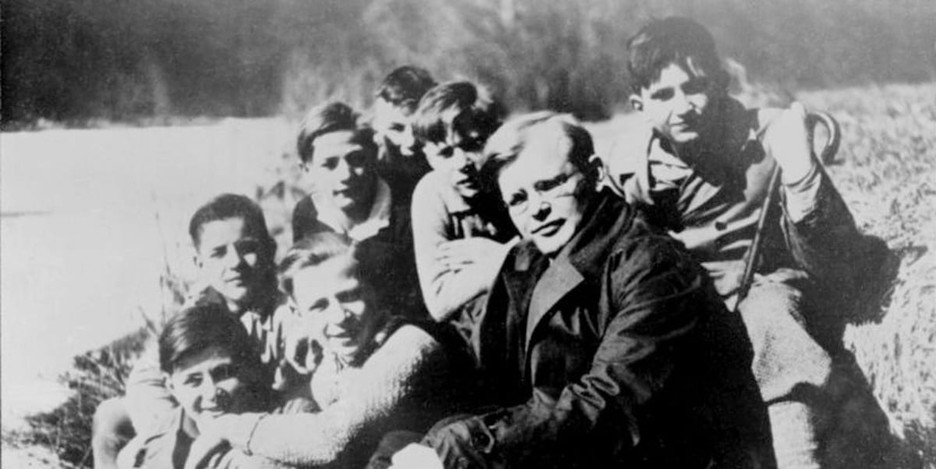
April 9 marks the day in 1945 that the Nazis executed theologian Dietrich Bonhoeffer. Dietrich was only 39 years old when he died, but his writings left a legacy that still provides valuable insight for Christians seeking to live faithfully to the Gospel in a culture dominated by hostile ideologies.
Chronological Timeline of the Life of Dietrich Bonhoeffer
Feb. 4, 1906 – Dietrich and twin sister Sabine born in Breslau, Germany
Aug. 1, 1931 – Becomes lecturer in Theology at the University of Berlin
Apr. 26, 1935 – Bonhoeffer establishes underground seminary for the Confessing Church at Zingst, which in June moves to Finkenwalde
Aug. 5, 1936 – Forbidden to lecture at the University of Berlin
1937 – Finkenwalde Seminary closed by Gestapo; 27 former Finkenwalde students imprisoned; Dietrich publishes Cost of Discipleship
Feb. 1938 – Makes first contact with conspirators in connection with political resistance against Hitler
Jun. 2, 1939 – Leaves for New York City
Jul. 27, 1939 – Dietrich Returns to Germany and joins the political resistance
Mar. 27, 1941 – Bonhoeffer is orbidden to print or publish
Sep. 1941 – Becomes part of Jewish rescue action (Operation 7)
Jan. 1943 – At age 36, Dietrich engaged to Maria von Wedemeyer
Apr. 5, 1943 – At age 37, Bonhoeffer is arrested and taken to Tegel Prison, Berlin; Dohnanyi and Dietrich's sister, Christine, also arrested
Feb. 7, 1945 – Moved to the Buchenwald Concentration Camp
Apr. 1945 – Discovery of Admiral Canaris' diary; Hitler orders annihilation of the Canaris group which includes Bonhoeffer
Apr. 9, 1945 – Dietrich Bonhoeffer, age 39, is hanged at Flossenburg; Dohnanyi, killed at the Sachsenhausen Camp
An Account of the Day that Bonhoeffer Died
FLOSSENBURG PRISON April 9, 1945: the controversial theologian Dietrich Bonhoeffer, along with other members of the Admiral Canaris resistance group, was executed here by hanging. Bonhoeffer went calmly to his death. This morning as he was led out of his cell, he was observed by the prison doctor who said: "Through the half-open door I saw Pastor Bonhoeffer still in his prison clothes, kneeling in fervent prayer to the Lord his God. The devotion and evident conviction of being heard that I saw in the prayer of this intensely captivating man moved me to the depths."
The prisoners were ordered to strip. Naked under the scaffold, Bonhoeffer knelt for one last time to pray. Five minutes later, he was dead.
Bonhoeffer was condemned for his involvement in "Operation 7," a rescue mission that had helped a small group of Jews over the German border and into Switzerland. The 39-year-old theologian had also been involved in planning an unsuccessful assassination attempt on the life of Adolf Hitler. His participation in the murder plot obviously conflicts with Bonhoeffer's position as a pacifist. His sister-in-law, Emmi Bonhoeffer, cited his reasoning. He told her: "If I see a madman driving a car into a group of innocent bystanders, then I can't, as a Christian, simply wait for the catastrophe and then comfort the wounded and bury the dead. I must try to wrestle the steering wheel out of the hands of the driver."
Interestingly, Bonhoeffer had safely escaped the troubles in Europe and gone to teach in New York in June 1939. He abruptly returned less than a month and later said: "I have had time to think and to pray about my situation, and that of my nation, and to have God's will for me clarified. I have come to the conclusion that I have made a mistake in coming to America. I shall have no right to participate in the reconstruction of the Christian life in Germany after the war if I did not share in the trials of this time with my people. Christians in Germany face the terrible alternative of willing the defeat of their nation in order that civilization may survive, or willing the victory of their nation and thereby destroying civilization. I know which of these alternatives I must choose. But I cannot make that choice in security."
Bonhoeffer, even while in prison, maintained his pastoral role. Those who were with him spoke of the guidance and spiritual inspiration he gave not only to fellow inmates but to prison guards as well.
In a letter smuggled out of prison. Bonhoeffer showed no bitterness but rather explained how, "We in the resistance have learned to see the great events of world history from below, from the perspective of the excluded, the ill-treated, the powerless, the oppressed and despised... so that personal suffering has become a more useful key for understanding the world than personal happiness."
EDITOR'S POSTSCRIPT: On April 30, 1945, the same month that Bonhoeffer was hanged, Hitler committed suicide. Seven days later Germany surrendered.
A Poem from Prison: "Who Am I?"
Who am I? They often tell me I would step from my cell's confinement calmly, cheerfully, firmly, like a squire from his country-house.
Who am I? They often tell me I would talk to my warden freely and friendly and clearly, as though it were mine to command.
Who am I? They also tell me I would bear the days of misfortune equably, smilingly, proudly, like one accustomed to win.
Am I then really all that which other men tell of, or am I only what I know of myself, restless and longing and sick, like a bird in a cage,
struggling for breath, as though hands were compressing my throat, yearning for colors, for flowers, for the voices of birds, thirsting for
words of kindness, for neighborliness, trembling with anger at despotisms and petty humiliation, tossing in expectation of great events,
powerlessly trembling for friends at an infinite distance, weary and empty at praying, at thinking, at making, faint and ready to say farewell to it all.
Who am I? This or the other? Am I one person today, and tomorrow another? Am I both at once? A hypocrite before others, and before myself a contemptibly woebegone weakling? Or is something within me still like a beaten army, fleeing in disorder from victory already achieved?
Who am I? They mock me, these lonely questions of mine. Whoever I am, Thou knowest, O God, I am thine.
Bonhoeffer biographer Eberhard Bethge was surprised to receive poems Bonhoeffer wrote in prison. The lines above give profound insight into his prison experience.
Dietrich's Daring Grandmother Defied the SS
Bonhoeffer was far from the only person in his family to stand against the Nazi regime. Hitler became chancellor in Germany on January 30, 1933; his government's first official act against the Jews was a one-day boycott of Jewish businesses on April 1, 1933. Pickets were placed in front of factories, stores, and shops belonging to Jews. Dietrich's grandmother, Julie Bonhoeffer, boldly walked through a group of Schutzstaffe (SS) officers into a Jewish department store and made a purchase. Marion Lehmann, an American friend of the family visiting them in Berlin at the time said, "(Julie) said she was not going to be told that she couldn't go inside because the owner was Jewish, so she walked right in and bought the strawberries... They didn't dare take this elderly woman. She was very alert and walked elegantly. So nobody was going to stop her!"
Further Reading For Bonhoeffer Buffs
For a biography of Bonhoeffer, Eberhard Bethge's Dietrich Bonhoeffer – Man of Vision, Man of Courage (published by Harpers) is an authoritative, detailed work written by one of Bonhoeffer's closest friends. But if you can afford only one book by or about Bonhoeffer we heartily recommend A Testament To Freedom: The Essential Writings of Dietrich Bonhoeffer, edited by Geffrey B. Kelly and F. Burton Nelson and published by Harper San Francisco. In addition to the best selections from Bonhoeffer's sermons, lectures, letters, and books, with some material in English for the first time, the editors also provide valuable introductions and a running biographical commentary.
The Dietrich Bonhoeffer Center is an important resource for Bonhoeffer studies. The Center houses the Dietrich Bonhoeffer Works project, serves as an ongoing institute to study his life and theology, is a national clearinghouse on Bonhoeffer materials and conducts annual seminars. For more information contact:
Wayne Whitson Floyd, Jr., Director
Dietrich Bonhoeffer Center
7301 Germantown Avenue
Philadelphia, PA 19119-1794
(215) 248-4616
Photo Credit: Wikimedia Commons/German Federal Archives


